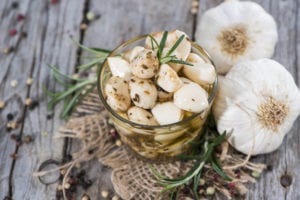Written by Jessica Patella, ND. Garlic supplementation significantly improved markers of inflammation in end-stage renal disease patients.
 End-stage renal disease patients have a lower life expectancy due to being dependent on dialysis 1,2. The mortality rate is 6.1-7.8 times greater than an age-matched population 1,3. Part of the risk factor is cardiovascular disease, but inflammation is also a critical risk for those with chronic kidney disease 1. Garlic is known for its effectiveness in improving markers of cardiovascular health and inflammation 1,4,5. For the first time a pilot study was conducted evaluating the effects of garlic on inflammatory markers in peritoneal dialysis patients 1.
End-stage renal disease patients have a lower life expectancy due to being dependent on dialysis 1,2. The mortality rate is 6.1-7.8 times greater than an age-matched population 1,3. Part of the risk factor is cardiovascular disease, but inflammation is also a critical risk for those with chronic kidney disease 1. Garlic is known for its effectiveness in improving markers of cardiovascular health and inflammation 1,4,5. For the first time a pilot study was conducted evaluating the effects of garlic on inflammatory markers in peritoneal dialysis patients 1.
The research included 42 patients (18-80 years of age) that were undergoing peritoneal dialysis 1. The patients were randomized into a garlic extract group (n=21, 400mg garlic extract twice daily for 8-weeks) or a placebo group (n=21) 1. Blood samples were collected to measure inflammatory markers in the body after fasting at baseline and after 8-weeks of supplementation 1.
The following results were observed after 8-weeks of supplementation:
- The average ESR-erythrocyte sedimentation rate (a marker of inflammation) decreased in the garlic treatment group compared to the placebo group.
- There was a significant change of -71.4% in CRP (C-reactive protein, a marker of inflammation) in the garlic group (p<0.001).
- IL-6, a marker of inflammation also improved with supplementation of garlic
- There were before and after changes within in the garlic group for IL-6, CRP, ESR and cholesterol levels (p<0.001, p<0.001, p=0.021, p=0.053, respectively)
- The garlic group also showed an increase in potassium levels compared to placebo.
In conclusion, oral supplementation of 400 mg garlic extract twice daily for 8-weeks improved selected inflammatory markers in patients undergoing peritoneal dialysis. Researchers suggest that due to the fact that these inflammatory markers may be a risk factor for peritoneal dialysis patients, this safe well-tolerated natural supplement should be considered 1. It is also important to point out this was a very small sample size and a larger trial is strongly recommended 1.
Source: Zare, Elham, Amirhesam Alirezaei, Mahmood Bakhtiyari, and Asieh Mansouri. “Evaluating the effect of garlic extract on serum inflammatory markers of peritoneal dialysis patients: a randomized double-blind clinical trial study.” BMC nephrology 20, no. 1 (2019): 26.
© The Author(s). 2019 Open Access Creative Commons Attribution 4.0 International License (http://creativecommons.org/licenses/by/4.0/) (http://creativecommons.org/publicdomain/zero/1.0/)
Click here to read the full text study.
Posted April 20, 2020.
References:
- Zare E, Alirezaei A, Bakhtiyari M, Mansouri A. Evaluating the effect of garlic extract on serum inflammatory markers of peritoneal dialysis patients: a randomized double-blind clinical trial study. BMC nephrology. 2019;20(1):26.
- Kalantar-Zadeh K, Block G, Humphreys MH, Kopple JD. Reverse epidemiology of cardiovascular risk factors in maintenance dialysis patients. Kidney international. 2003;63(3):793-808.
- Li PK-T, Ng JK-C, Mcintyre CW. Inflammation and peritoneal dialysis. Paper presented at: Seminars in nephrology2017.
- Silagy CA, Neil H. A meta-analysis of the effect of garlic on blood pressure. 1994.
- Quintero-Fabián S, Ortuño-Sahagún D, Vázquez-Carrera M, López-Roa RI. Alliin, a garlic (Allium sativum) compound, prevents LPS-induced inflammation in 3T3-L1 adipocytes. Mediators of inflammation. 2013;2013.

